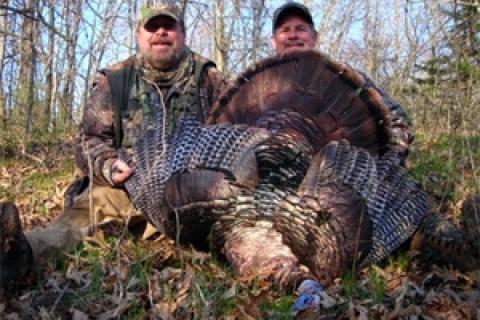
 There weren't any turkey hunting experts around when Ray Eye first began turkey hunting. "I believe many hunters develop bad calling habits from listening to videos by the experts," Eye lamented. "There were no videos around wean I started. I have spent decades, 12 months a year, following turkeys with my video camera, documenting all phases and seasonality during winter, summer, fall and spring. This has reinforced how valuable good, realistic calling skills are for consistent success in turkey hunting."
There weren't any turkey hunting experts around when Ray Eye first began turkey hunting. "I believe many hunters develop bad calling habits from listening to videos by the experts," Eye lamented. "There were no videos around wean I started. I have spent decades, 12 months a year, following turkeys with my video camera, documenting all phases and seasonality during winter, summer, fall and spring. This has reinforced how valuable good, realistic calling skills are for consistent success in turkey hunting."
Eye has suffered the indignation of being chastised in many locales for calling too much. Local pros call him in to help them kill an unkillable gobbler. "It has happened dozens of times over the years," he says. "Hunting pros invite me to their place to solve the mystery of some phantom gobbler, which they can't kill. I arrived in one such camp and the host made it clear that calling was only 10 percent of the equation. He felt that woodsmanship was 90 percent responsible for success. I reminded him of his statement early the next morning as we watched a pair of gobblers begin to walk off after they flew down from the roost. When he asked me why I wasn't calling, I reminded him about his faith in woodmanship. When he conceded I should call, one of the birds responded almost immediately. Twenty minutes later, we wrapped a tag around its leg."
Eye has duplicated the feat many times over. "The myth of the call shy gobbler abounds," Eye remarked. "In fact, of all the things turkey hunters argue about, nothing increases blood pressures like a heated debate over how much one should call and the fact that calling creates call-shy gobblers. I have battled with stubborn guides, outfitters and local hunters who scorn my calling techniques, because they think I will make birds call shy. I have proven over and over that birds do not become call shy. Turkeys call every day of their lives. In reality, they do not become call shy. They become people shy. It is excessive human activity that shuts down gobblers, not calling.
"It makes no sense that wild turkeys would shy away from calls of their own kind. Hens call to their poults while they are still in the egg. Turkeys hatch with the ability to communicate. Turkeys, however, will shy away from bad, unrealistic calling. Learning to call realistically is everything in turkey hunting. Learn to call realistically and the unkillable gobblers in your life will disappear."
Ray Eye calls to turkeys almost constantly while hunting. Too, he calls loud and aggressively. As John Sabata, a Hawaiian turkey hunting guide, says, "uncle Ray makes their ears bleed."
I, too, thought Ray Eye was a nut case when I first began hunting with him. He made my ears bleed. I didn't become a believer in his calling tactics until I met up with him about 11 a.m. one morning, after I had experienced little success. I had struck a bird early and managed to get it to gobble twice. I sat in the same spot all morning waiting for that bird to show itself. When I told Eye the story, he popped his mouth call in and began a series of loud, aggressive calls. On the fifth series, the gobbler broke loose. Ten minutes later it lay flopping on the ground."
"When you learn to call realistically and sound like a turkey and communicate with them aggressively, all those call shy turkeys that give you a hard time, will simply disappear," Eye said.
Ray Eye is now offering an online class, "Calling Is Everything." Sign up at www.rayeye.com.
- 3430 views

